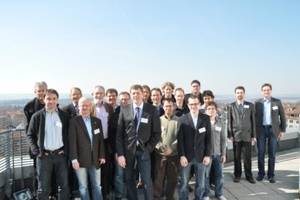Project Description
 |
Solar storms are a consequence of sudden eruptions of magnetised gas in the Sun’s outer atmosphere. Commonly such storms start with a sudden release of electromagnetic radiation lasting for some minutes (a solar flare) and by an eruption of a giant cloud of magnetised plasma – a coronal mass ejection (CME), accompanied with beams of very energetic particles emitted into space. The fastest of these “space hurricanes” are accelerated to speeds of ten million kilometres per hour and, if heading in the direction of Earth, reach our home planet, at a distance of 150 million km, in less than a day.
Solar storms affect the Earth environment from the magnetosphere down to the ionosphere, and even to the lower atmosphere climate system. The natural hazards of severe space weather have the potential to catastrophically disrupt the operations of technological systems, such as communication systems and power grids on Earth. The next period of strongest solar activity in the eleven-year solar cycle of the sun – a so called solar activity maximum – will occur after 2012, raising the risks of extreme space weather events. Through the AFFECTS (Advanced Forecast For Ensuring Communications Through Space) project funded by the European Union’s 7th Framework Programme, European and US scientists develop an advanced prototype space weather warning system to safeguard the operation of telecommunication and navigation systems on Earth to the threat of solar storms.
The AFFECTS project is led by the University of Göttingen’s Institute for Astrophysics and comprises world-wide leading research and academic institutions and industrial enterprises from Germany, Belgium, Ukraine, Norway and the United States. The Planetarium Hamburg is the project’s educational and public outreach center.
Work Packages (WP)
The AFFECTS project consists of the following 6 WP:
1. Management (Lead: Dr. V. Bothmer)
2. Data, Calibration, Maintenance and Instrumentation (Prof. C. Hall)
3. Early Warning System (Dr. C. Verbeeck)
4. Forecasting Tools and Modelling (Dr. A. Parnowski)
5. Forecast System Ionosphere (Dr. J. Berdermann)
6. Data and Product Dissemination, Project Sustainability (Dr. R. Van der Linden)